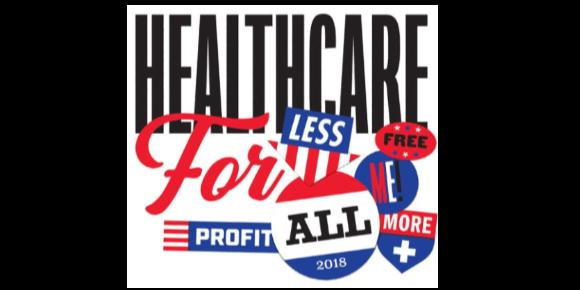
- posted: Oct. 31, 2019
Mediocrity for all
Edward J Malik
Don’t worry, your government is here to help with healthcare again, promising to lower prices, improve quality and provide care to everyone, if we just give them total control.
Though the argument that government can do these things has been debunked by economics and experience, we do need to have this debate again. Medicare For All may be a fantasy, but we will likely see another politically expedient fix that makes the system worse. Our feckless Congress would rather keep the issue an open political wound.
Our emerging generation must also reconcile their conflicted chants of “keep the government out of woman’s healthcare decisions” while advocating complete government control of all our healthcare decisions under “Medicare for all.”
To increase support for single payer healthcare, we will see headlines designed to scare and deceive rather than inform, like this from Time Magazine, “America has the worst health care in the world”. Citing only the Commonwealth Fund, smushy statistics and subjective surveys place our care near the bottom with Cuba.
Our life expectancy, for example, has recently declined a bit relative to other countries (after doubling in the last century). Take out our increased automobile accidents and gang violence and that difference evaporates.
These comparison stats are deceptive during political debate, and are dependent on many other factors, from income, nutrition, hygiene and climate, to fraud in the reporting. It can be argued that the uninsured in America often receive better care than Chinese citizens with universal coverage.
Those advocating single payer centralized healthcare have every duty to present evidence how this will accomplish our shared goal of lower costs, better access and higher quality, and what will be done when it fails. They cannot rest on the claim that “every other industrialized country does it”, an argument my mother never accepted, and one that is not true. Single payer centralized systems exist in only a few places, notably the U.K. and our own V.A. All other systems including Medicare, rely on private companies. The celebrated Scandinavian countries are moving toward privatization.
Instead of evidence, there is the claim that healthcare is a right and not a privilege, though Webster considers those synonymous and sociology places health on the list of basic needs, along with food, shelter, sex and self-actualization. We can agree the government has a role in assisting with certain of those needs, but not all.
During this debate, we will hear America spends the most on healthcare, each of us spending $9600 per year. As such an important need, that is in line with spending on shelter ($18,000) and food ($8500). We also spend $4800 on the average vacation, and over $20,000 more than any others on cars. We spend more on cosmetic surgery, teeth whitening, dental implants, and hair plugs too, because we can.
Since resources are limited, other systems ration care directly with denials, delays and lack of access. In America, our system rations care based on affordability. Insurance premiums, copays and medications are too expensive. Pre-existing conditions and the risk of cancellation are real. And many still go without insurance, at least at times. But if you own a car and a cell phone, have satellite TV and a few tattoos, you can afford your basic health care and insurance. Is this a real crisis?
We will hear that medical bills are responsible for most personal bankruptcies, from a fraudulent report co-authored by Elizabeth Warren. The real number is between 4-18%, while Canadian rates are 15%. The Frasier Institute reports “there is no objective evidence that a government run health care system in the U.S. will reduce personal bankruptcies”, and the real bankruptcy problem in medical care involves the Canadian Provinces, with medical costs exceeding 40% of the budget.
We’ll hear that medical pricing and demand is inelastic, that it can’t work in a free market because we can’t understand complex treatments and make proper choices. Yet most seem to understand the risks, benefits, and payments for LASIK. And everyone knows the costs and payments for care and treatment of their dog. Lack of this consumer attitude regarding our own care is the single biggest problem.
The government has had many chances to fix this over the past 90 years. In the process they have given us a system that is absurdly complex, wastes over 30% of the money, stifles creativity and fails to cover everyone. We’ll hear that it is profiteering in the private sector to blame, and the government the only answer to rescue us. Yet insurance company profits reported by ABC News were $6 billion, a modest 3% of revenues, in a year when Medicare alone lost $60 billion in waste and fraud.
There has been little free market in medical insurance since Medicare became law. It controls paperwork and pricing for the entire industry. The relationship between government regulators and the industry is more a cartel than a free market. In some areas today, there may be only one insurer and only one hospital company. Medicare is nearly insolvent, funded by a Ponzi scheme that regressively redistributes resources and cost 300% more than projected in its first decade.
Since 2010, over 50% of all Healthcare Expenditures in America have been paid by the government, making ours the world’s largest socialized system already. The narrative that benevolent government needs to rescue us from an evil corporate takeover is a myth.
In 1923 the government created Blue Cross to support the hospital industry. The consequence is our current opaque, non-competitive hospital system serving doctors, not patients.
During the depression, government wage controls encouraged employer-based health insurance. The consequences are the portability problem, pre-existing conditions, and perverse tax incentives.
Medicare cemented the fee-for-service model and the insane coding system and must approve new therapy before others will.
Medicaid failed to provide quality care or to lower the bar enough to avoid personal bankruptcy. It also added another layer of middlemen at the State level.
Reagan added the Emergency Medical Act, guaranteeing emergent care to anyone, creating our problems of ER abuse and cost shifting.
The Affordable Care Act was promised to cover the uninsured and lower costs, failing at both, and exposing the crony relationship between government and industry.
These government fixes have created the problems they now offer to fix. None of the government systems has met proforma projections and goals. None meet the definition of “insurance”. None is ever declared a failure.
If the government wanted to lower the cost of health insurance it would respect supply and demand, understand human nature, remove taxes and restrictions, and get out of the market. Instead they offer a monopoly to dictate, not negotiate. The government is the reason health insurance is too expensive.
If the government wanted efficiency and to treat us all equally, they would not have created seven distinct and redundant systems, for the elderly, the poor, the active military, retired and injured military, one for American Indians, one for children and of course another for themselves.
If the government wanted to fix the procurement and payment problems, they wouldn’t propose the world’s largest middleman and most obscure tax system.
If they wanted to cover every remaining uninsured person, they simply would, with tax credits and direct subsidies to purchase private insurance and cover all routine care. That would cost $250 billion. (The annual interest on the national debt is $390 billion.)
If the government wanted lower drug costs, they would approach our friends and have them stop price fixing brand medications. New drug development in these countries has stalled. Instead they want us to join the price fixing world when we already have the lowest prices on generic drugs thanks to Walmart and Target. They could do the same for name brands in a free worldwide market.
The main reason healthcare costs more is that there is more, and it works, keeping us alive through multiple events. We live within a one-day drive of the top five rated hospitals and clinics in the world. We have eight of the top ten medical schools in the world and remain the destination for timely advanced care.
Modern cataract surgery and LASIK were advanced on West Sahara Boulevard, and when there is a breakthrough in Alzheimer’s Disease, it might happen here in downtown Las Vegas.
American industries currently produce the most innovative treatments and medications. Socialized systems everywhere depend extensively on the talent and capital of the private market, the same market they constantly blame, regulate and control.
With so many great ideas requiring less government, there is no need to nationalize the medical industry and every reason to move the other way, keeping the government in its proper role of consumer advocate and real market watchdog. Those who think government can be heavy handed and unfair when policing should consider how they might handle medical care when there is no other choice.
More government involvement in medical care will guarantee mediocrity, destroy innovation, and increase costs. It’s nonsense. Maybe that’s the point.
Edward Malik is a doctor of Optometry and musician. He writes from Las Vegas Nevada.
Hours of Operaton
Our Regular Schedule
8:00 am - 5:00 pm
8:00 am - 5:00 pm
8:00 am - 6:00 pm
8:00 am - 5:00 pm
8:00 am - 5:00 pm
10:00 am - 4:00 pm
CLOSED
Location
Find us on the map
11035 Lavender Hill Dr Ste 180
Las Vegas, NV 89146, US









